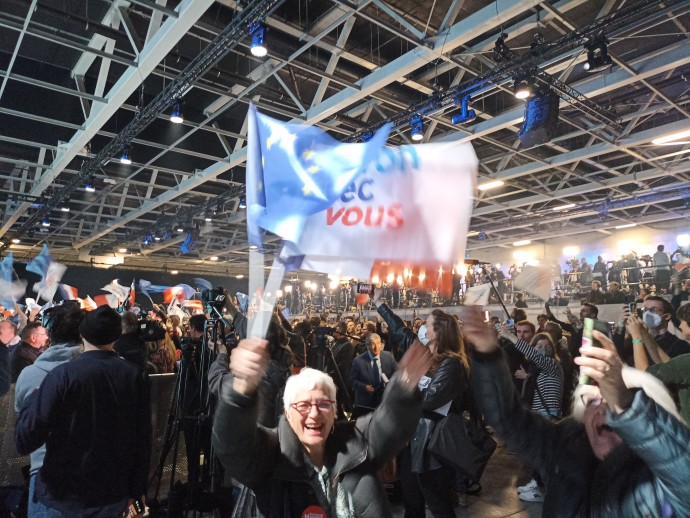A sigh of relief from one, and disappointment from the other. The team of incumbent French President Emmanuel Macron was relieved on Sunday evening when TV stations published preliminary first results of the day’s presidential elections.
Macron garnered 28% of the vote, compared with 23% for Marine Le Pen. The result was much better for Macron than the one predicted by the polls over the weekend.
Some polls even predicted that Le Pen would come out first.
Final results were to be announced later, but Macron is clearly in the lead, well-positioned for the runoff on April 24.
Far-left Jean-Luc Melenchon came in third, and far-right Eric Zemmour came in fourth.

The announcement of the results generated cries of joy from Macron supporters in Paris, with people hugging, dancing and chanting, “And one [mandate] and two [mandate], and five more years.” Others cried, “Macron president.” Some supporters started singing the French national anthem, “La Marseillaise.”
Most of those at campaign headquarters were people in their early 20s who had voted for the first time.
Macron voted Sunday morning in his hometown of Touquet, in the Pas-de-Calais region in the north of France. Formally dressed in a blue suit, blue tie and taking his time at the polling booth, he shook hands with the many people who came to see him, joked around with the organizers and smiled widely at the cameras.
He later traveled to Paris to the Elysée, before joining his supporters and the journalists at the grand exposition center Porte de Versailles in the west of the city for the 8 p.m. announcement of the results.
Originally, his team had reserved another venue in the north of Paris, in a more popular, middle-class neighborhood. But the large number of journalists interested in covering the event, both from France and abroad, and the thousands of supporters who registered to come apparently persuaded his team to relocate to a larger venue.
Le Pen voted in the morning at her hometown of Hénin-Beaumont, also in Pas-de-Calais. After voting, she traveled back to Paris with some family members, including one of her nieces (not including her niece Marion Marechal, who had abandoned her aunt at the beginning of the electoral campaign to join the other far-right candidate, Zemmour) and her mother.
Five hundred of her closest associates and supporting parliamentarians were invited for the festive, more formal-style electoral evening. The National Assembly leader chose to view the results at the prestigious Pavillon Chesnaie Du Roy in the Vincennes Forest, east of Paris. Champagne glasses were aligned at the beautiful hall well ahead of the results.
As far as Le Pen was concerned, she was expecting only good news. Either she would come in first, or she would come in second. Surveys published on Saturday predicted that she would win between 24% and 25% of the vote, compared with 26% and 27% for Macron. One of her close associates, who is Jewish, told The Jerusalem Post he was optimistic the final count of votes would show better results for her.
Still, the mood was less cheerful than Le Pen had expected. The National Assembly leader delivered a well-rehearsed speech, hoping to collect more votes for the second round, but she looked tired and disappointed.
Macron and Le Pen were not the only ones to vote early in the morning. The first candidate to vote was Socialist Paris Mayor Anne Hidalgo, who arrived at 8:30 a.m. at a kindergarten in the neighborhood where she has been voting for the past decade.
All day long, French TV stations reported on low voting rates compared with the last presidential elections in 2017. By 5 p.m., numbers reached 65%, compared with 69.42% at the same time in 2017.
The main reason the predictions of low turnout were correct was public despair over politics. Sunday’s election lacked the great momentum generated in 2017, when popular right-wing candidate Francois Fillon had to step down after a political scandal, and the rather anonymous candidate Emmanuel Macron dramatically arrived on the political scene, swiping the electorate off its feet. French voters are tired of their politicians, after the yellow-vest, high-cost-of-living demonstrations and two long years of the COVID-19 pandemic.
Macron led the polls throughout the election campaign, even though he was practically absent from it. He refused to engage in the traditional TV debate among all the candidates, apparently to highlight the difference between himself, the young incumbent, and the other 11 candidates.
The Russian invasion of Ukraine also legitimized to some extent his decision to focus on affairs of state and not on reelection. Thus, he convened only one big election rally on April 2 in a concert hall west of Paris.
Macron’s tactic was risky. Contrary to Macron, Le Pen started campaigning from the moment she lost the 2017 elections. She distanced herself from her father (condemned in the past for antisemitic and racist remarks), managing to rebrand herself as mainstream.
The appearance on the political scene of Zemmour also helped establish her as relatively more moderate. For five years, she crisscrossed France, purposely ditching the strategy of big rallies. That choice, at least in the first round of voting, did not pay off as she had wished.
